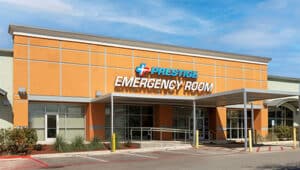Abdominal pain can be caused by different things, including something as simple as overeating or something as serious as appendicitis. Estimates show that at least one in every twenty individuals gets appendicitis in the United States. While it can occur at any age, the inflammation is rare in children aged 2 and below. Appendicitis mostly affects individuals aged 10 to 30.
What Is Appendicitis?
Appendicitis refers to an inflammation of the appendix, which mainly occurs when an individual’s appendix gets blocked by a foreign body. However, an infection in the body can also lead to inflammation, and in some cases, cancer can also cause appendicitis.
Appendicitis can begin as normal abdominal pain, making it hard to self-diagnose without medical expertise. Given that abdominal pain can also be caused by muscle strain, stress, or constipation, how does one know when to visit the emergency room?
When should you go to the emergency room for abdominal pain?
The inflammation caused by appendicitis normally causes pain in the lower right abdomen that increases and becomes severe as the inflammation worsens. Therefore, any sudden pain on the right side of the lower abdomen may signify that you need to go to the ER.
Experiencing pain that begins around the navel and shifts to the lower right abdomen is also a sign of appendicitis, and you should seek medical assistance. Additionally, if you notice any pain that worsens when you walk, cough, or make jarring movements, this may be a sign of appendicitis.
Other symptoms of appendicitis include a loss of appetite, nausea and vomiting, diarrhea or constipation, abdominal bloating, and low-grade fever, which worsens as the pain gets worse. The pain migrates in some cases, depending on an individual’s appendix position and age.
If a pregnant woman’s appendix is inflamed, the pain may be felt in their upper abdomen as the appendix pushes higher when one is pregnant.
Timely diagnosis and treatment of appendicitis are essential. The risk of perforation or rupture grows significantly, especially after 36 hours from the symptoms’ onset. If your symptoms worsen as time passes, call your doctor or visit an ER.
How is Appendicitis Diagnosed?
Diagnosing appendicitis can be challenging as its symptoms are similar to other ailments, such as kidney stones, gastritis, ectopic pregnancy, urinary tract or bladder infections, Crohn’s disease, and gallbladder problems.
In the emergency room, you may have your abdomen examined for inflammation. Additionally, physicians may conduct various tests, including blood tests to see whether the body is fighting an infection and a urine test to eliminate the possibility of a urinary tract infection.
In addition to lab tests and a physical examination, you may also undergo a computed tomography scan, which is more sensitive than an ultrasound.
What Complications Can Appendicitis Cause?
Standard treatment for appendicitis is the appendix’s surgical removal. If one does not seek medical attention after observing the symptoms mentioned above, the appendix may burst.
A burst appendix may lead to the development of an abscess, a pocket of infection that is drained during surgery, to prevent infection in the abdominal cavity.
Delays may also lead to a ruptured appendix, spreading infection throughout an individual’s body. This infection, known as peritonitis, is a life-threatening condition that requires immediate surgery to remove the appendix and clean the abdominal cavity.
Antibiotics are sometimes prescribed before surgery to fight infection.
What Should You Not Do if You Have Appendicitis?
If you are yet to be diagnosed, or even after diagnosis, you should avoid the following practices:
- heating pads
- Antacids
- Laxatives
They can cause an inflamed appendix to rupture. You shouldn’t take any pain pills or antibiotics either, as the drugs can make it harder to diagnose appendicitis.
Additionally, you should not eat or drink unless your physician gives the go-ahead, as you may require surgery.
When Should You Call Your Doctor After an Appendectomy?
Visit your doctor immediately if you notice increased abdominal pain, fever, uncontrolled vomiting, blood in your urine or vomit, increased pain or redness in the area of incision, dizziness, or pus in the wound.
What Other Conditions Can Cause Abdominal Pain?
Acid reflux
This is a digestive illness caused by bile or stomach acid irritating the esophagus lining. Symptoms include chest pain, heartburn, difficulty swallowing, and a sour taste in the mouth.
Pancreatitis
Acute pancreatitis refers to an inflammation of the pancreas. This inflammation usually begins suddenly and may last some days. It is caused by different factors, including heavy and chronic alcohol use and gallstones. It usually presents as serious pain in an individual’s upper belly and often causes nausea and vomiting.
Gallbladder disease
This disease is caused by the gallbladder’s inflammation, blockage, or infection. Symptoms include sporadic pain in the upper right abdomen, which sometimes radiates to the upper back. Individuals may also experience nausea and vomiting.
As you can see, many conditions can cause abdominal pain. That’s why it isn’t easy for the average person to determine the specific cause of their pain. To be safe, visit Prestige ER as soon as you experience any abdominal pain. We can help you take the right course of action for the root cause of the abdominal pain you are experiencing.












